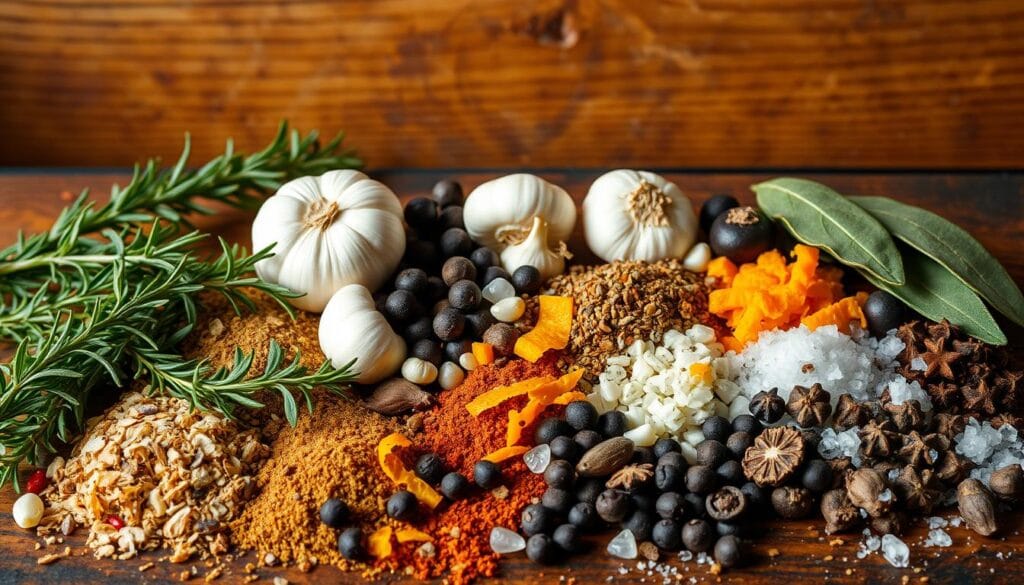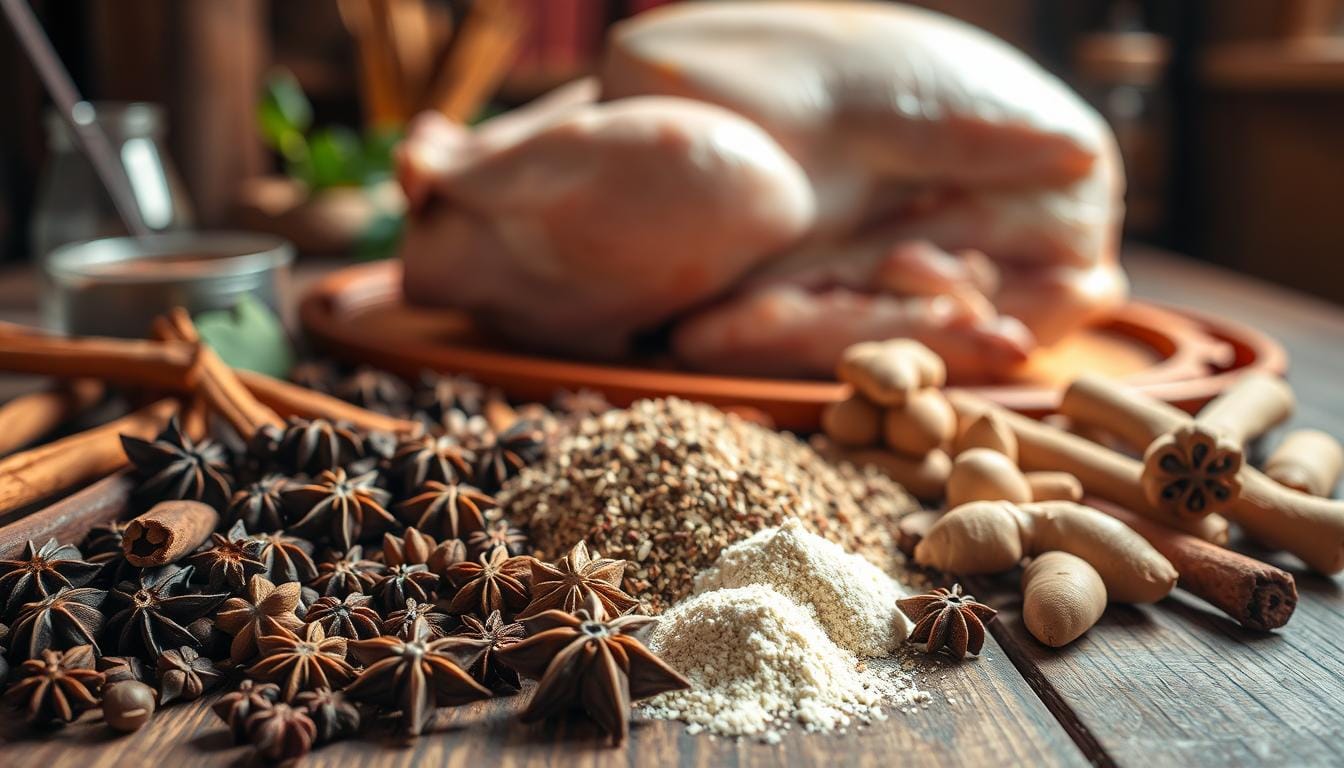Flavorful Thanksgiving: The best spices for turkey
What makes a Thanksgiving turkey unforgettable? Is it the cooking method or the spices used? Choosing the right spices is key for a delicious Thanksgiving meal. With many best spices for turkey out there, picking the right one can be tough.
Mixing different spices can make your turkey taste amazing. Whether you stick to traditional flavors or try something new, the right spices can make your Thanksgiving special. You can use classic herbs or bold flavors to season your turkey.
The Art of Turkey Seasoning
Exploring different turkey seasoning blends is important. Finding the right one can make your Thanksgiving meal unforgettable. By mastering turkey seasoning, you can impress your guests with a delicious turkey.
Key Takeaways
- Using the best spices for turkey is essential for a flavorful Thanksgiving meal
- Turkey seasoning blends can be customized to suit individual taste preferences
- Understanding the art of mixing and matching spices can elevate the dining experience
- Classic herb combinations and bold flavors can be used to create unique turkey seasoning blends
- Mastering the art of turkey seasoning can make your Thanksgiving meal truly unforgettable
- Experimenting with different spices and seasoning blends can help you find the perfect flavor for your turkey
The Art of Turkey Seasoning: A Thanksgiving Tradition
Turkey seasoning is key to Thanksgiving in the United States. It’s a tradition passed down through generations. Each family has its own secret blend. A spice rub for turkey can elevate the flavor.
Choosing the right herbs for roasted turkey is important. Thyme, rosemary, and sage are popular choices. You can use them fresh or dried, mixing them with other spices for a unique taste.

- Use a mix of spices and herbs for a balanced flavor
- Try a spice rub for turkey for deeper flavors
- Experiment with different herbs for roasted turkey to find your favorite
By following these tips, you can make a delicious Thanksgiving turkey. Your family and friends will love it.
Best Spices for Turkey: Essential Ingredients for Success
Preparing a delicious Thanksgiving turkey requires the right flavorful seasonings for thanksgiving turkey. The secret to a tasty turkey is using quality ingredients and traditional spices. Knowing the essential ingredients is key to a successful and flavorful turkey.
Start with basic spices that enhance the turkey’s natural taste. Salt, pepper, sage, and thyme are staples. These flavorful seasonings for thanksgiving turkey form a solid base. Adding garlic, onion, and paprika can also boost the flavor and create a unique taste.

Choosing high-quality ingredients and using them correctly is crucial. Mix herbs and spices that complement each other, not overpower the turkey. With the right flavorful seasonings for thanksgiving turkey and a few tips, you’ll make a memorable turkey that wows everyone.
Here are some popular spice blends for turkey:
- Classic herb blend: sage, thyme, rosemary, and parsley
- Spicy blend: paprika, garlic, onion, and cayenne pepper
- Lemon pepper blend: lemon zest, black pepper, and garlic
Try different flavorful seasonings for thanksgiving turkey combinations to find your favorite. This way, you can make a Thanksgiving dinner that everyone will remember.
Creating the Perfect Turkey Seasoning Blend
To make a delicious holiday turkey, the right spices are key. The top spices for holiday turkey are essential in any traditional turkey spice mix. When making the perfect blend, consider a few important elements.
Start with the base spices needed for every turkey. These are salt, pepper, and herbs like thyme and sage. Then, add optional flavor enhancers to make it unique. Paprika, garlic powder, and onion powder are popular choices.
Base Spices for Every Turkey
- Salt
- Pepper
- Thyme
- Sage
Optional Flavor Enhancers
- Paprika
- Garlic powder
- Onion powder
Measuring and mixing spices is crucial. Start with a small amount of each and adjust to taste. You can also use a pre-mixed spice mix as a base and add your own flavors.
By following these tips and trying different spice combinations, you can make a memorable traditional turkey spice mix. It will surely impress your friends and family.
Fresh vs. Dried Herbs: Making the Right Choice
Choosing between fresh and dried herbs can greatly affect your turkey’s taste. Fresh herbs like parsley, rosemary, and thyme bring a lively flavor. Dried herbs, on the other hand, last longer and are easier to store.
Fresh herbs give a bright taste to your turkey seasoning. But, they cost more and don’t last as long. Dried herbs are cheaper and keep longer. Many people mix both for the best flavor.
Some top herbs for turkey seasoning are:
- Thyme: adds a savory and slightly minty flavor
- Rosemary: provides a piney and herbaceous flavor
- Parsley: adds a fresh and green flavor
- Sage: offers a savory and slightly bitter flavor
Whether to use fresh or dried herbs depends on what you like and the flavor you want. Knowing the pros and cons of each helps you choose. This way, you can make a turkey that wows everyone.
Regional Turkey Seasoning Variations Across America
Exploring the different ways to flavor Thanksgiving turkeys shows each region’s unique twist. From the South to New England and the Southwest, every area has its own flavor. They all use the best spices for turkey in special ways.
In the South, turkey seasonings mix herbs and spices like paprika, garlic powder, and onion powder. This mix gives a rich, savory taste. It’s a key part of Southern cuisine’s bold spice blends for turkey.
Southern-Style Seasoning Inspirations
- Paprika and garlic powder for a smoky flavor
- Onion powder and thyme for added depth
- Cayenne pepper for a spicy kick
New England’s turkey traditions focus on subtle flavors. They use fresh herbs like sage and parsley. These choices show how important the right spices are for a memorable Thanksgiving.
New England’s Fresh Herb Approach
The Southwest is known for its bold flavors. They use chili powder, cumin, and smoked paprika. These variations show the creativity and diversity of American cuisine, with many bold spice blends for turkey.
Timing Your Turkey Seasoning: When and How to Apply
Timing is crucial when it comes to turkey seasoning. To get a flavorful turkey, apply the seasonings at the right moment. This lets the flavors soak into the meat evenly. A spice rub can be added hours or even days before cooking.
It’s important to think about the seasoning type. Dry rubs go straight on the meat. But marinades and brines need more time. Always follow the recipe instructions for the best taste.
Here are some tips for seasoning your turkey:
- Apply dry rubs 2-4 hours before cooking for maximum flavor impact
- Use marinades 24 hours before cooking for tender and juicy meat
- Brine the turkey 12-24 hours before cooking for a moist and flavorful bird
By following these tips and using the right seasonings, you’ll make a delicious turkey. It’s perfect for impressing your guests. Whether you’re experienced or new to cooking, timing and seasoning are key.
Bold and Unique Spice Combinations for Adventurous Cooks
The first paragraph is not a of the article is a of the article that can be written in “The first paragraph is not a of the article’s content type=”The first paragraph is not a of the first paragraph is not a of the article’s content type=”The first paragraph is not a of the article’s content type=”The first paragraph is not a of the first paragraph is not a of the article’s content type ‘The first paragraph is not a of the article’s content type ‘The first paragraph is not a of the article’s content type ‘The first paragraph is not a of the article’s content type ‘The first paragraph is not a of the article’s content type ‘The first paragraph is not a of the article’s content type ‘The first paragraph is not a of the first paragraph is not a of the article’s content type ‘The first paragraph is not a of the article’s content type ‘The first paragraph is not a of the article’s content type ‘The first paragraph is not a of the article’s content type ‘The first paragraph is not a of the article’s content type ‘The first paragraph is not a of the first paragraph is not a of the first paragraph is not a of the first paragraph is not a of the article’s content type ‘The first paragraph is not a of the first paragraph is not a of the of the of the first paragraph is not a of the article’s content type ‘The first paragraph is not a of the first paragraph is not aassistant to the current section of the article
### Step theassistant to the current section of the article is not available
Common Seasoning Mistakes to Avoid
Preparing a delicious holiday turkey requires the right top spices for holiday turkey. A balanced traditional turkey spice mix is key for flavor and aroma. But, common seasoning mistakes can spoil the dish.
Common errors include over-seasoning, which can mask the turkey’s natural taste. Timing is also crucial, as applying spices too early or late can affect the flavor.
Other mistakes include poor storage, which can reduce spice flavor and aroma. Knowing these mistakes helps you avoid them. Here are some tips:
- Choose fresh, quality spices for the best taste.
- Measure spices carefully to prevent over-seasoning.
- Season at the right time during cooking.
- Store spices in a cool, dry place to keep their flavor.
Follow these tips and use a balanced traditional turkey spice mix for a memorable turkey. Always pick the top spices for holiday turkey and season with confidence to avoid mistakes.
Complementary Seasonings for Turkey Gravy and Stuffing
To make your Thanksgiving meal stand out, think about using savory turkey seasoning and bold spice blends. These can make your gravy and stuffing taste amazing. The goal is to find the right mix that brings out the best in your turkey and side dishes.
Start with top-notch ingredients like fresh herbs and spices. A blend of thyme, rosemary, and sage works well with turkey. For more flavor, add bold spice blends for turkey to your gravy and stuffing. Try mixing paprika, garlic powder, and onion powder.
Here are some tips for making great seasonings for your turkey gravy and stuffing:
- Use a mix of fresh and dried herbs for depth and complexity
- Try different bold spice blends for turkey to find the right mix
- Add a bit of lemon juice or vinegar to brighten your flavors
By using these tips and adding savory turkey seasoning and bold spice blends for turkey
Conclusion: Mastering Your Turkey Seasoning Strategy
Starting your Thanksgiving turkey journey? The secret to a delicious feast is in your seasoning strategy. The best spices for turkey and turkey seasoning blends can make your bird unforgettable. Try new flavor mixes, regional spices, and modern methods to create your unique turkey seasoning.
Do you like the classic flavors of sage, thyme, and rosemary? Or do you want to try something new? The world of turkey seasoning is vast. Let your creativity run wild. With practice and experimentation, you’ll become a turkey seasoning master. Your Thanksgiving feast will be a hit for years to come.







